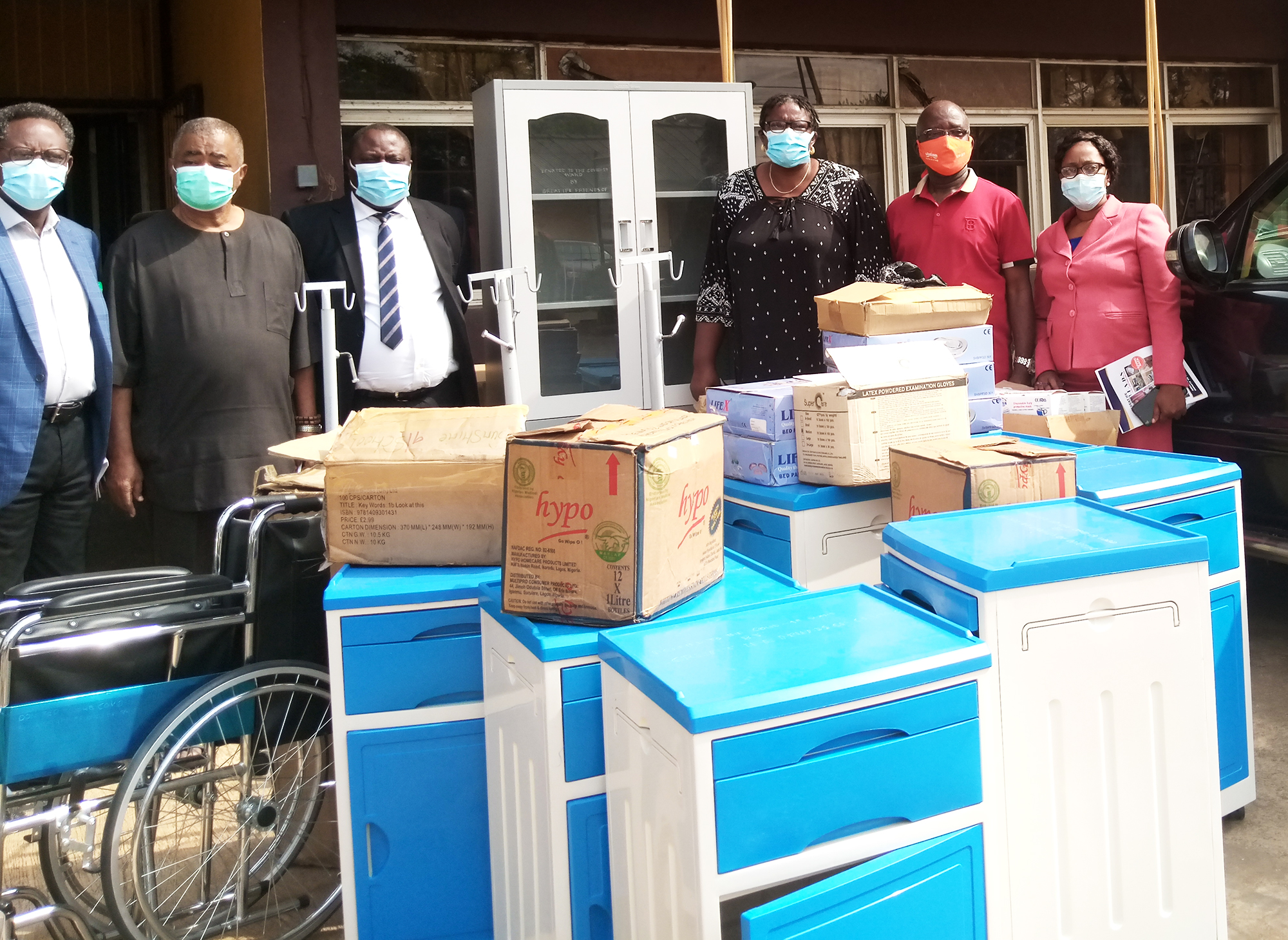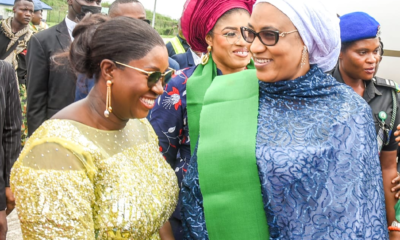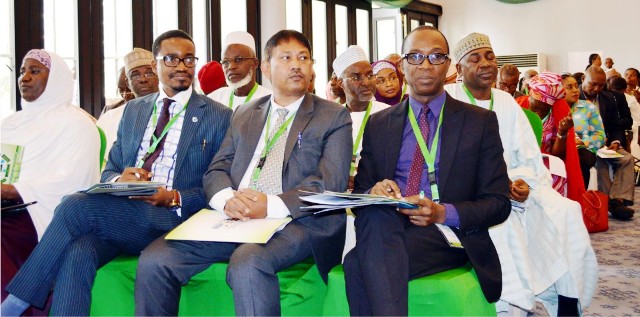News
$500m World Bank Electricity Fund: SERAP Seeks Publication Of Details

The Socio-Economic Rights and Accountability Project (SERAP) has urged the World Bank to release archival records and documents relating to spending on all approved funds to improve access to electricity in Nigeria between 1999 and 2020.
It also demanded it to show the bank’s role in the implementation of any funded electricity projects, identify and name any executed projects, and Nigerian officials, ministries, departments and agencies involved in the execution of such projects.
The World Bank Board of Directors had, last week, approved $500million to help boost access to electricity in Nigeria and improve the performance of the electricity distribution companies in the country.
In the application to World Bank President, Mr David Malpass, dated February 6, 2021, signed by SERAP Deputy Director, Kolawole Oluwadare, the organization urged the Bank to explain the rationale for the approval of $500million to implement electricity projects in the country, despite reports of widespread and systemic corruption in the sector, and the failure of the authorities to enforce a court judgment ordering the release of details of payments to allegedly corrupt electricity contractors who failed to execute any projects.
SERAP said, “This application is brought pursuant to the World Bank’s Access to Information Policy, which aims to maximize access to information and promote the public good. There is a public interest in Nigerians knowing about the Bank’s supervisory role and specifically its involvement in the implementation of electricity projects, which it has so far funded.”
According to SERAP, “The $500million is part of the over $1billion available to Nigeria under the project titled: Nigeria Distribution Sector Recovery Program.
“We would be grateful for details of any transparency and accountability mechanisms under the agreement for the release of funds, including whether there is any provision that would allow Nigerians and civil society to monitor the spending of the money by the government, its agencies, and electricity distribution companies.”
SERAP also said, “Should the Bank fail and/or refuse to release the information and documents as requested, SERAP would file an appeal to the Secretariat of the Bank’s Access to Information Committee to challenge any such decision, and if it becomes necessary, to the Access to Information Appeals Board. SERAP may also consider other legal options outside the Bank’s Access to Information framework.”
The letter, copied to the World Bank Country Director for Nigeria, Shubham Chaudhuri, reads in part, “SERAP believes that releasing the information and documents would enable Nigerians and civil society to meaningfully engage in the implementation of electricity projects funded by the Bank, contribute to the greater public good, and enhance the Bank’s oft-stated commitment to transparency and accountability.
“The World Bank has been and continues to be involved in overseeing the transfer, disbursement, spending of funds on electricity projects in Nigeria. The Bank also reportedly approved a $750million loan for Nigeria’s electricity sector in June, 2020, to cut tariff shortfalls, protect the poor from price adjustments, and increase power supply to the grid. As such, the World Bank is not a neutral party in this matter.
“SERAP is seriously concerned that the funds approved by the Bank are vulnerable to corruption and mismanagement. The World Bank has a responsibility to ensure that the Nigerian authorities and their agencies are transparent and accountable to Nigerians in how they spend the approved funds for electricity projects in the country, and to reduce vulnerability to corruption and mismanagement.
“SERAP also believes that the release of the requested information and documents is of paramount importance to the public interest in preserving the legitimacy, credibility and relevance of the Bank as a leading international development institution. The Bank ought to lead by example in issues such as transparency and public disclosure raised in this request.
“It would also demonstrate that the Bank is willing to put people first in the implementation of its development and governance policies and mandates, as well as remove any suspicion of the Bank’s complicity in the alleged mismanagement of electricity projects-related funds.
“SERAP’s report, titled: From darkness to darkness: How Nigerians are paying the price for corruption in the electricity sector documents widespread and systemic corruption in the electricity sector, and reveals how about N11trillion electricity fund was squandered by successive administrations in Nigeria since the return of democracy in 1999.
“This report raises specific questions of public interest, and the World Bank ought to be concerned about how Nigerian authorities are addressing reports of widespread and systemic corruption in the electricity sector, and to seek some answers from the authorities on the problems.”
SERAP, while noting that millions of Nigerians still lack access to free pre-paid meters, stressed that authorities continue to use patently illegal and inordinate estimated billing across the country, increasing consumer costs, and marginalizing Nigerians living in extreme poverty.
The organisation, therefore, urged Malpass to disclose and release information and documents relating to the spending of funds approved and released to Nigeria between 1999 and 2020 to improve access to regular and uninterrupted electricity supply, including copies of supervision reports, periodic reviews and other appropriate reports on the bank’s role in the spending and disbursement of the funds, as well as specific projects on which the funds have been spent, among others.
Earlier, the World Bank had approved the sum of $500million to Nigeria to boost access to electricity and improve the performance of electricity distribution in Nigeria.
The bank, in a statement issued, last Friday, titled, ‘Nigeria to Improve Electricity Access and Services to Citizens,’ said financial support would be provided to private distribution companies only on achievement of results in terms of access connections, improved financial management and network expansion.
The statement said, “85 million Nigerians don’t have access to grid electricity. This represents 43% per cent of the country’s population and makes Nigeria the country with the largest energy access deficit in the world.
“The lack of reliable power is a significant constraint for citizens and businesses, resulting on annual economic losses estimated at $26.2billion (¦ 10.1trillion) which is equivalent to about two per cent of GDP.
According to the 2020 World Bank Doing Business report, “Nigeria ranks 171 out of 190 countries in getting electricity and electricity access is seen as one of the major constraints for the private sector.”
The statement quoted World Bank Country Director, Shubham Chaudhuri, as saying, “Improving access and reliability of power is key to reduce poverty and unlocking economic growth in the aftermath of the global Covid-19 pandemic.
“The operation will help improve the financial viability of the DISCOs and increase revenues for the whole Nigerian power sector, which is critical to save scarce fiscal resources and create jobs by increasing the productivity of private and public enterprises.
“The Nigeria Distribution Sector Recovery Program (DISREP) will help improve service quality, as well as, the financial and technical performance of distribution companies by providing financing based on performance and reduction of losses. This project complements the support provided under the Power Sector Recovery Operation (PSRO) approved in June, 2020.
“Specifically, it will ensure that distribution companies make necessary investments to rehabilitate networks, install electric meters for more accurate customer billing and to improve quality of service for those already connected to the grid. It will also help strengthen the financial and technical management of DISCOs to improve the transparency and accountability of the distribution sector.”
According to the World Bank task team leader for the project, Nataliya Kulichenko, “The program will only be eligible to those DISCOs that transparently declare their performance reports to public with the actual flow of funds based on strict verification of achieved performance targets by an independent third party. The program would also make meters available at affordable prices to all consumers in Nigeria, a long pending demand of Nigerians.”
The statement added that “the program will reduce the CO2 emissions of the Nigerian power sector by reducing technical losses, increasing energy efficiency, replacing diesel and biomass with grid-electricity, and investing more in on- and off-grid renewable energy. DISREP supports the development of regulatory guidance on climate-resilient infrastructure and facilitates the inclusion of climate risks in decision making.”
News
Microsoft Nigeria Not Shutting Down, Presidency Replies Obi
The Senior Special Assistant on Media and Publicity to President Bola Tinubu, Temitope Ajayi, has refuted media reports claiming the shut down of the Lagos office of Microsoft’s Africa Development Centre.
While noting that the shutdown was an “incorrect media report,” Ajayi said the organisation was “re-aligning roles” within its business, while “few roles will certainly be impacted.”
He stated this yesterday on his X handle @TheTope_Ajayi.
Tweeting, the presidential aide also faulted the tweet made late Wednesday on the same subject by the 2023 Labour Party presidential candidate, Peter Obi, labelling it a “naked dance.”
Obi had lamented the announcement on the shutdown, saying it “underscores the urgent need for comprehensive economic reforms in Nigeria.”
Obi’s tweet partly read, “The recent announcement of Microsoft Nigeria to its workers about shutting down its innovation centre in Lagos and cutting 200 jobs is deeply troubling. It underscores the urgent need for comprehensive economic reforms in Nigeria.
“This further highlights the challenges and broader issues plaguing the Nigerian economy. The closure of Microsoft’s innovation centre represents yet another significant setback for Nigeria’s aspirations to become a hub for technology and innovation in Africa.”
The former Anambra State Governor tweeted that the shutdown “raises serious concerns” about Nigeria’s “business environment for investors.”
Reacting to this, Ajayi noted, “The story that Microsoft is shutting down Nigeria office is not true. Africa Development Centre is just a department within Microsoft business in Nigeria. Contrary to incorrect media reports and Peter Obi’s naked dance, the Africa Development Centre is also not shutting down.
“Microsoft, like any other organisation, is only re-aligning roles within the business, and few roles will certainly be impacted. Affected staff, which are less than 30, will be asked to apply for new roles within Microsoft – a standard practice within the organisation.”
The presidential aide added that employees “who can’t find new roles in other departments or those who want to seek new opportunities outside the system will be asked to go. The situation at Microsoft is not anywhere near the impression of the ‘earthquake’ that Peter Obi sensationally described.”
News
Dep Gov, Others Eulogise Blessing Ahiazu At 70
Rivers State Deputy Governor Professor Mrs Ngozi Odu was among friends and well-wishers who came out to celebrate Professor Blessing Ahiazu as she turned 70.
In what would best be described as a captivating send off for a woman who spent the better part of her life in the academia, colleagues, friends, church members and a host of dignitaries converged at her residence for a warm reception.
Speaking at the event, the deputy governor of Rivers state, Prof. Ngozi Nma Odu said the celebrant is a selfless contributor to humanity, and not just the academic environment.
“Having worked closely with her over the years, while she’s celebrating 70 today, I’ll add one and half to that one, yet I call her Sister Bless. She is worthy of emulation and congratulations are in order”, she said.
Laying emphasis on the words of the Deputy Governor, the Vice chancellor of Rivers State University, Prof. Nlerum Sunday Okogbule, described Prof. Blessing as a first class academic and dogged fighter, adding that her contributions to the university development would be indelible in the sands of time.
“Being the first professor of Rivers State Library, I am proud of her virtues.
“Having worked for 44 years and served under 6 vice chancellors without query, is commendable” he said.
Eulogising her prowess, other speakers from the university Department of Library Science spoke highly of her readiness and availability to service.
Speaking about the celebration, Prof. Blessing said that the university moulded her into the dynamic woman everyone was celebrating.
She advised those in the system and those who wished to go in to be diligent in carrying out their duties.
“Those still serving should defer gratification and work first, gratification will come later. And those who seek to go in, when they go in, they should focus on the job. Greed is a killer. Quick fix is not the best attitude in life. Slow and steady, they say wins the race. And with the backing of God, they will make it”, she said.
One of the highlights of the ceremony was the lunching of her second autobiography titled “Seven Decades of Rainbow Path”
Joining a host of dignitaries and egg heads at the occasion to pay tribute and lunch the book, Professor Emeritus, and former Vice Chancellor of the then Rivers state university of Science and Technology (UniTech), Prof. Simon Achinewhu, said that the realisation that the celebrant had played her part in the Department of Library Science was soul lifting.
He prayed that she would live to see the goodness of God accomplished in her life.
Giving a review of the book, the author said, having worked in the university for over 44 years, the university environment moulded her into the woman she had become. Stating clearly, she said the book is written for her children and grandchildren
”I have sat down to write about myself. The good side and the not-so-good side of the story.
“The challenges and the exploits . So that on that last day, my children will pick it up and extract what they want and add what they will like to add and that becomes the biography of their mother.”
The author further stated that the book would encourage younger ones to learn diligence to be able to succeed in life.
John Bibor
News
Methodist Church Lauds Fubara Over Peaceful Disposition
The Methodist Church of Nigeria Diocese of Gokana, in Mogho Circuit, has commended the Rivers State Governor, Sir Siminialayi Fubara, for his peaceful disposition and creation of harmonious environment for co-existence of various ethnic groups in the State.
This was contained a communique issued at the end of their 12th synod in Mogho, and signed by Very Rev. Baridam N. C. Jason and Rt. Rev. Joseph P. Bel- Aanen, Synod secretary and Diocesan Bishop respectively.
The Synod which was attended by a large number of delegates had the theme, “ARISE AND BUILD” which was taken from the book of Nehemiah 2:18.
The church noted with pain the unbearable and excruciating suffering of people across Nigeria, mainly caused by the sudden and unplanned removal of fuel subsidy coupled with the steady decline in the value of the naira against the dollar which has triggered unprecedented rise in the cost of living generally.
“The Federal Government of Nigeria should rather focus on long-term sustainable measures in addressing the numerous challenges facing the country instead of its short-term plans of using palliatives to stop hunger and suffering in the land.
“As Church we decried the incessant callous invasion and continuous destruction of lives and properties by Boko Haram, armed bandits and Fulani herdsmen in different parts of the country.
“We equally condemn in strong terms the recent invasion of Agbeta Community in Eleme Local Government Area of Rivers State by Fulani herdsmen who not only abducted children and raped women, also destroyed farm produce worth millions of naira with their cattle, thereby causing hunger and hardship in the area,” they said.
They further used the forum to condemn in strong terms the institution of same sex marriage and transgender practices by some religious organizations in some parts of the world and called on religious and non-governmental organizations to brace up and be united in the fight against the twin sexual perversions of same sex marriage and transgender practices in Nigeria.
Tonye Orabere
-

 Featured4 days ago
Featured4 days agoLady Fubara Restates Rivers’ Support For President’s RHI …As Mrs. Tinubu Launches RHI-WASP For S’South To Curb Food Crisis
-

 News3 days ago
News3 days agoNLC Rejects CBN’s Cybersecurity Levy
-
News3 days ago
Reps Urge CBN To Halt Implementation Of Cyber Security Levy
-
News3 days ago
Microsoft Nigeria Not Shutting Down, Presidency Replies Obi
-
Health4 days ago
Malaria Accounts For 30 % Of Childhood Deaths-NMEP
-

 News3 days ago
News3 days agoFG Committed To Reducing Carbon Footprint –NCCC
-
Opinion3 days ago
Consumer Credit Scheme: How Desirable?
-

 Business2 days ago
Business2 days agoExpert Harps On Cloud Technology Adoption

